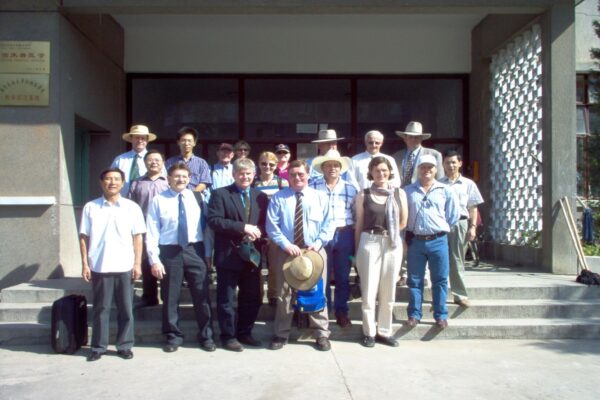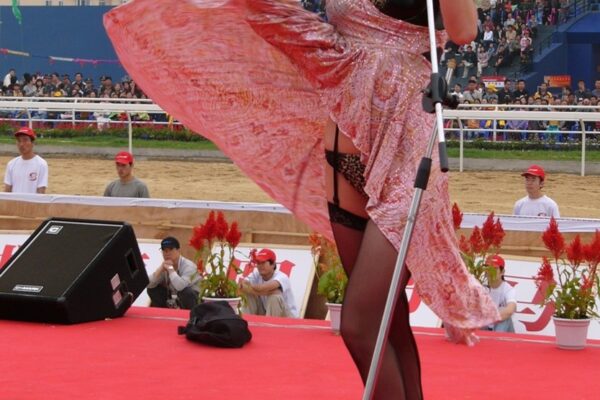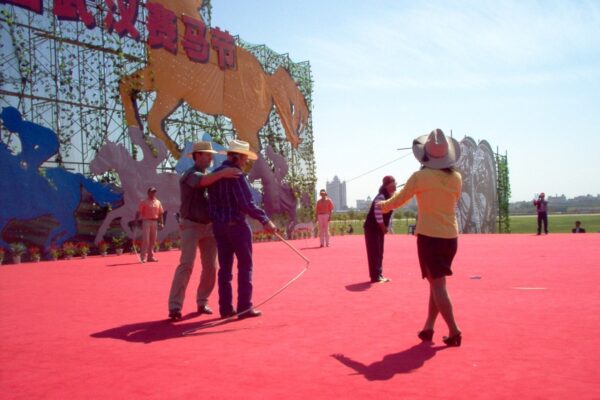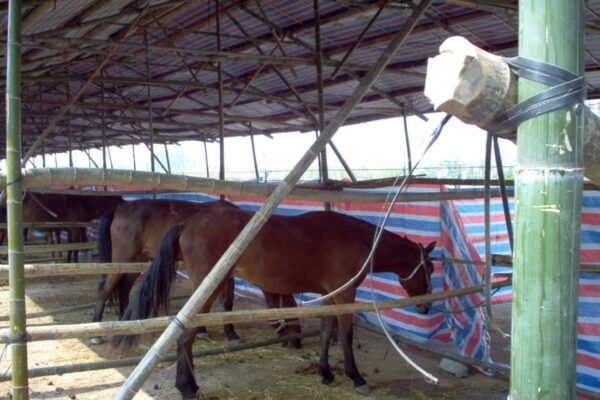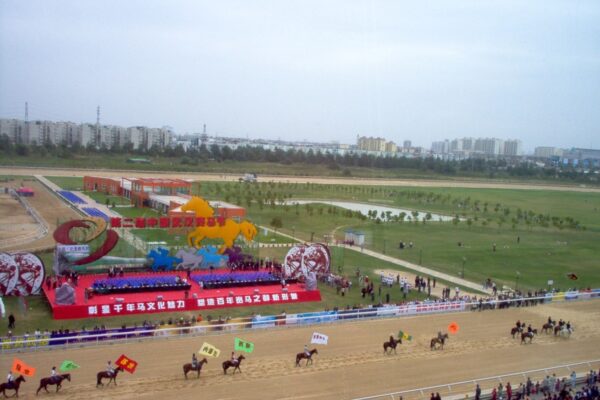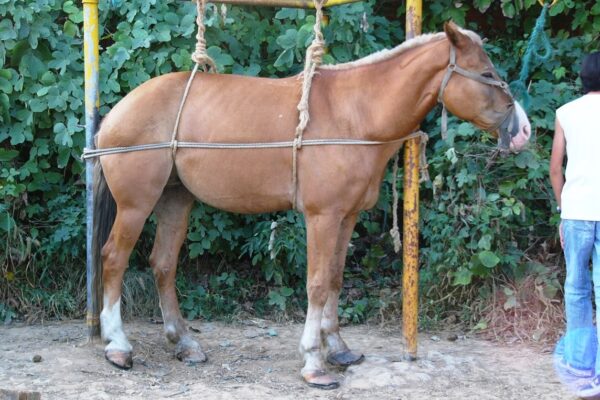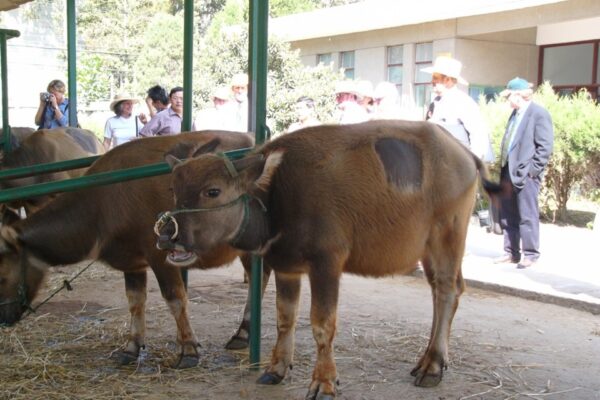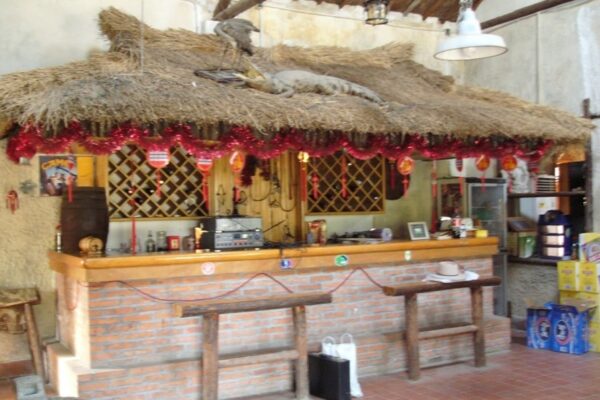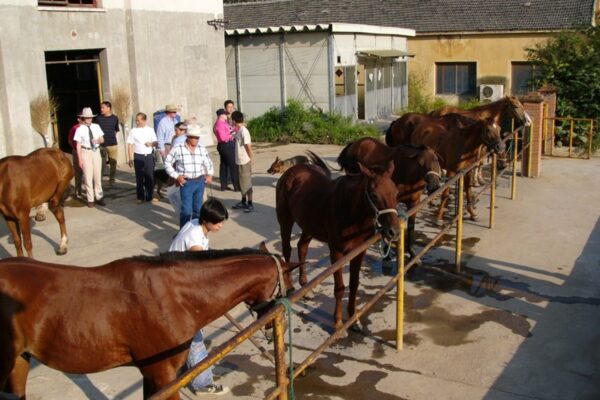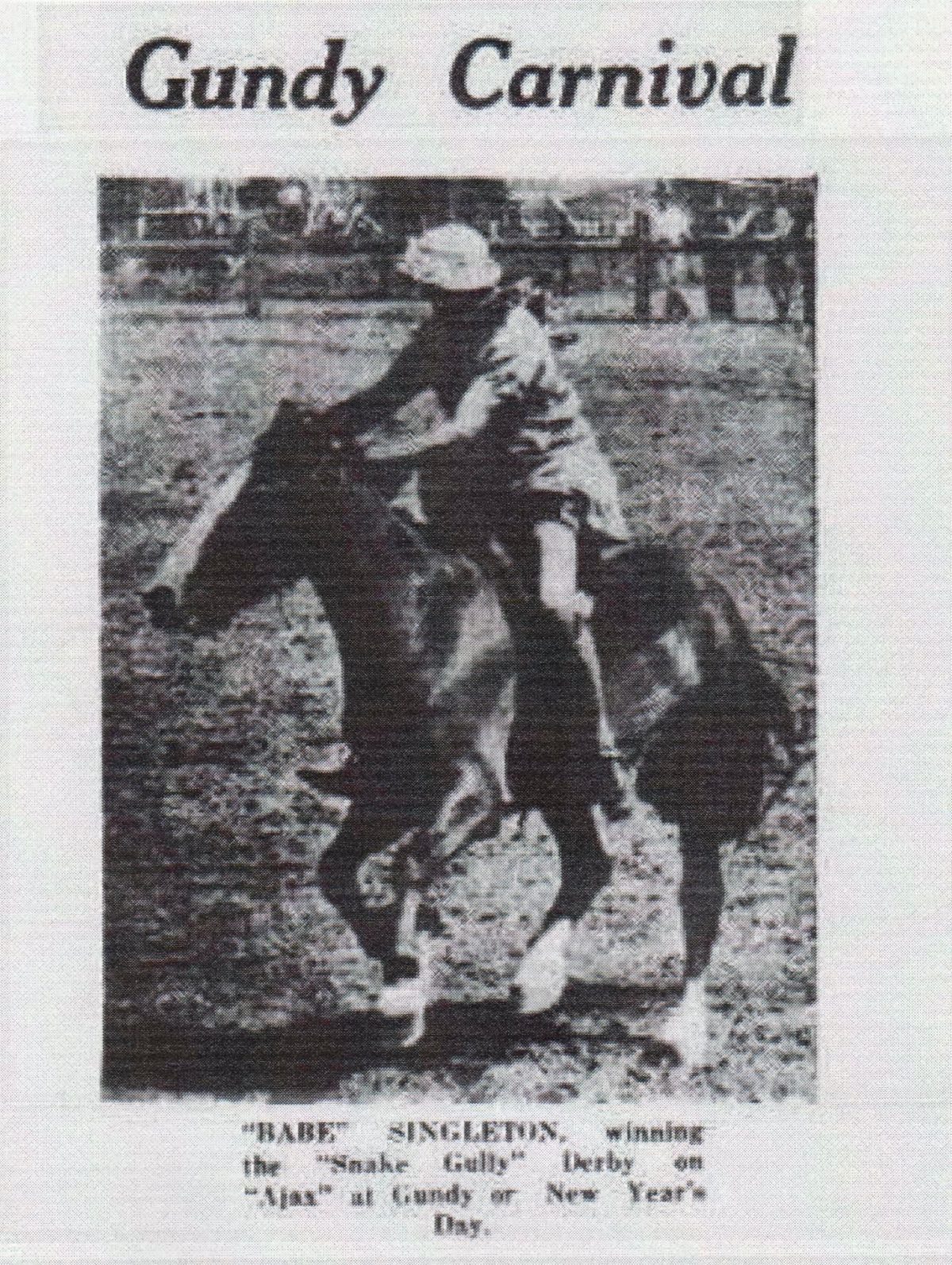‘THEY’RE OFF”!
RACING WHEN THE ‘NO. 9’ MEN OPERATED.
SPURTS, SPURTERS, AND DOINGS ON THE BUSH TRACKS
‘THEM WAS THE DAYS”
The Scone Advocate, Friday 6th January 1939
Featured Image:
“Babe” Singleton wins the “Snake Gully” Derby on “Ajax” at Gundy on New Years’ Day 1939. Starters and riders in the ‘Snake Gully Derby’ included ‘Babe’ Singleton on ‘Ajax’, Bill Holmes on ‘Socks’ who ran second and Bill Phillips riding ‘Static’. The ‘ladies’ in the race asked for no quarter and received none! ‘Babe’ and ‘Ajax’ won by half a lap, with ‘two lengths of the paddock between second and third’! The journalist writes (in parenthesis) ‘the third horse had not passed the post when this edition went to press’. The race took place on January the 1st; even the great Ken Howard would have had trouble describing the result?
When Babe Singleton was stallion groom at Widden there is a famous photograph of Babe ‘boxing’ with ‘Brueghel’ who is rearing on his hind legs. Babe was also featured in an article in the Sydney Morning Herald written by Steve Crawley. He is outside the ‘Linga Longa’ accompanied by a gaggle of geese!
Best boy riders at the Gundy Carnival were A Reid, J McInes, N Watts, D Watts, C McPhee and R Wharton.
Memories of the old ARC days of racing in the district are revived with the consistent running of Mr. Frank Whyte’s gelding, ‘Our Voyage’, who is by a Politic colt out of a Poseidon mare. Our Voyage has won at Newcastle, Tamworth, Armidale, etc., and on Boxing Day was narrowly defeated for the Wallabadah Cup, after trailing the field by many lengths before the run home in the short straight was entered upon. In the years gone by, Frank was a power to be reckoned with on the many district and inter-district courses — in the days quite a few of the ‘No. 9’ fielders settled if they had the ready cash. When they were short, punters just had to wait — some are still waiting. Needless to say, disputes were the order of the day, and at times it was Donnybrook over again. However, Frank had four speedy customers with which to try out the best. With honest old Sweet Voyage he collected no fewer than 37 races, and with his dandy little mare Ivy Graft he picked up 25 firsts. Then there was Miss Kinetic, who poked her head first past the winning post on 22 occasions. Flirt, a mare by Phil May, had her number hoisted, or chalked up, 17 times.
Yes, ‘them was the days,’ as ‘Jimmy’ Jones was wont to say when he was winning right and left with Cyrus Knight, a little brown bally entire by Cyrus. ‘Her a dood ‘un,’ Jim would exclaim as he led the apple of his eye back to the enclosure — beg pardon, the wire fence, or shade of a tree — following still another triumph. But Frank and Jim did not have matters all their own way. There were many contemporaries and strong rivals. Of these, there was Tom Harney and his wonderful galloper, Ellimark, a grey, whose loping strides gave manv a fielder a ‘headache.’ The old mare also measured paces on many tracks, suburban, Maitland, and Tamworth districts, as well as the dozen or so then in use in the Upper Hunter. Galloping in a stride, as it were, she took some running down, and it was almost invariably a case of ‘bellows to mend’ for most of her rivals before the post was reached.
On the old Aberdeen track one afternoon, she was saddled against a field, including a mare from the Skelton stable, brought up by two well-known local sportsmen, and who backed their ‘importation’ off the map, only to see her well and truly shaded by the old grey (10 to 1). Even after her retirement, she was taken to the scene of many of her best performances at Aberdeen between the shafts of a sulky. Ellimark was one of the versatile tribe. ‘Billy’ Hill was on the track and without a mount. He begged of the tall Mooby-ite to allow her to run in the ‘big money,’ a five furlongs event carrying a ‘fiver.’ Tom took a lot of persuading, but eventually yielded. The sweat was knocked off the mare, and before long she was nosing the starting tapes. Jack Tracey, Roger Whalen, and their confreres of the ‘bag’ were yelling themselves hoarse to get a little cash on her at 10 to 1. There was one I solitary taker of £5 to 10/-. The field jumped away. At the judge there was only one in it — Ellimark. The prize went to the rider without any deductions. Tom also saddled quite a number of others, including two mares by Famous, Famouslike and Famous Pet, and with them had his full share of wins. Famous Pet was a slick customer up to half a mile. When in her heyday she was taken to Sydney with another galloper, O’Shea, The late Harry O’Neile had come into the kaleidoscope by this time. She was made favourite at Ascot, went like the proverbial ‘scalded cat’ for four furlongs, and then petered out of the picture. Two races later O’Shea was saddled for a mile race. The party by this time was ‘on the rocks,’ and had the mortification of seeing him take out with lengths to spare. And a generous betting ring failed to elicit any business at 33 to 1! 0f course, Jack McGregor was one of the downcast party, and even the subsequent successes in the bush of Blue Peter failed to compensate him when the tide of fortune was against him.
Then there was the excitable Jim Murphy, who owned a chestnut, Blue Label, by Garlin, a Newmarket Handicap winner. Jim had a great run for a time, lifting a treble with him at Kars Springs one day. Incidentally, ‘Kruger’ (Dad) Dodds rode five winners on this pretty little track one day. His reward was ‘thank you’ 25 times and two half-crowns. And it was thirsty weather, too. ‘Bill’ Pinkerton, of ‘Gum Flat,’ Gundy, always had a decent galloper or two as a side-line from sheep and cattle raising. With old Brilliant Chiel, one of the most honest and consistent mares in the game, he won almost at will, and under crushing weights, at that. When he placed the mare aside following her couple of score of wins, he mated her with the Carbine horse, Sir Whitton, and the result was another cracker-jack, which he named Dark Whitton. Endowed with all her dam’s speed and honesty, he picked up races in all company with her. But an incident on the old Nundle track one New Year’s Day sickened him of the game. W.J.P. was no punter. He merely entered into the sport, as already stated, I as a side-line — relaxation. Dark Whitton had won the big event hands down, from webbing to winning post, but the race was awarded to another runner, whose owner, a true sportsman, refused to accept the judge’s verdict. At Kars Springs, oil another occasion, she was pitted against a good field, when the ‘man who has last say’ made an honest mistake in giving the race to another brown mare, Ina Eaton, from the Merriwa side. Dark Whitton had led throughout. The same owner had another great little mare, Diana, by Sir Whitton, one of the smartest gallopers up to four furlongs for her inches in the land. He likewise had a couple of other ponies which more than paid their way.
Syd Smith, of Aberdeen, had a little galloper, Dolly Grey, and she must have scored as many wins as Bradman has run up centuries. She was like a cat out of the machine, and simply toyed with her fields. The late Rupert Golledge, of Gundy, had an-other good little one in Maori Girl, I and one of the prettiest striders of her I time. Alan McLean, of Kars Springs, who has Marie Belle and College Lass, had a few slippery goers, and with Jack picked up a parcel of races. Of course Donald McPhee was well in the game, just as he still holds his own on the cricket field. Two extra smart ones in his care were Blarney Castle and Little Mag, and a third one, probably better than the pair mentioned, the name of which has, like the rainy seasons of old, slipped from the writer’s memory. And Charlie Challis, not to be outdone, got hold of one he called Belford, with which he looked for bigger game farther afield, whither he transported the gelding on one of his lorries. Charlie, like many other contemporaries, was in the game for the fun he got out of it, yet he had a sequence of successes.
Racing verily makes strange bed fellows and rings in the changes. In his earlier days he drove teams of horses for a livelihood, walking tens of thousands of miles up and down the Hunter beside his steeds. In later days he transported horses in grandiose style to far-away tracks! The writer had almost passed over Harry Knight, of Lower Rouchel, who, like quite a number of others mentioned, has passed on from this mortal coil. The old man, who derived much pleasure from the sport, invariably had a tidy string of horses, and had a penchant for those of the Phil May strain. Did not Phil May win a Newcastle Cup in the days when that race carried as much interest to northerners as the big draw cards do at the A.J.C. and V.R.C. carnivals? One of his best candidates was Phil Grey, who popped up with a pleasing frequency to H.K. who at one fixture on the little track in the bend of the Hunter below “Kingsfield” saddled up all three starters in an event. ‘You can back your fancy, boys; they are all going,’ was this sportsman’s advice to his friends. And the trio figured in a thrilling finish. Harry Knight was a man of big frame and heart, and when sovereigns were as scarce as hairs on Frank White’s top-piece, he was wont to dredge a supply for these outings, and he put them into circulation, too.
Of course, there were many others who joined in and made the fun, but these notes are just made from memory, and, besides, the ink has given out in the bottle and must be re-filled. And not only the ink container, these torrid times. These meetings naturally attracted the bookmaking gentry from all points of the compass, and many a trap they set for the unwary. False prices were called to draw business. If the horse lost, all was well. If it won, it was not uncommon to discover that the name on the ticket differed from that on the bag of the fielder who had issued it. These fellows would just ‘blow in’ and ‘blow out’ again, leaving many punters wiser, if poorer, men. But they would come again like a hardy annual, and the bettors, strange to say, would came at them again, only to be taken in again. The majority of the fielders, however, were like Ellimark, Brilliant Chiel etc., honest, and paid out with a smile.
Yes, ‘them was the days’ all right — the days when Ernie Marks got his start. It was at Aberdeen when a Dalmeny mare came home ‘weight correct,’ but without a ‘bob’ on her. On the roadside that afternoon, E.J.M. counted and had a re-count of one hundred and fifty of the best while the driver of the car was investigating some engine trouble or other. The arguments, ‘ramps,’ and reversals of form of some of the horses will keep for the rainy and cooler weather.
